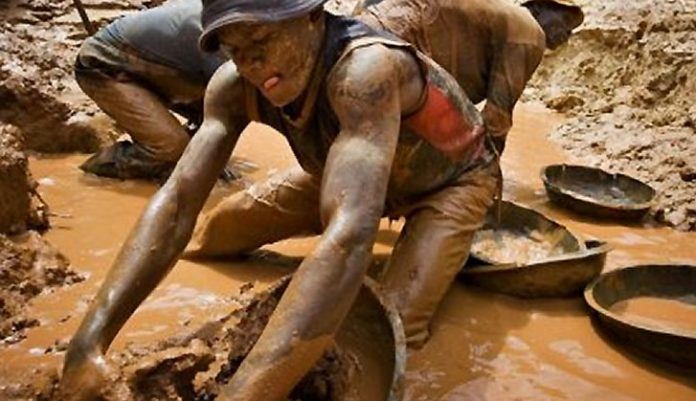Farai Mabeza
Miners at two of the most crowded artisanal and illegal mining hotspots in the country, Marange diamond fields and Wanderer Gold Mine in Shurugwi, have defied the nationwide lockdown ordered by President Emmerson Mnangagwa to combat the spread of the Coronavirus (COVID-19) pandemic, according to a report by the Zimbabwe Environmental Lawyers Association (ZELA).
In the report, titled COVID- 19: Mining Sector and Communities’ Situational Report, ZELA said the miners have not only ignored the lockdown but were also not observing any safety measures.
“At Wanderer Mine in Shurugwi artisanal diggers did not heed the lockdown call and continued mining despite the perennial safety and health concerns and accidents at the site and the large number of artisan diggers working there,” ZELA said.
“It was also reported that illegal miners (gwejas) are still illegally mining diamonds in Marange without any regard to social distancing. At funerals, not many people are observing the social distancing protocols or any safety measures or limitations of number of people per funeral to 50,” the report added.
While the artisanal and small scale mining sector (ASM) is a critical sector in gold production, accounting for more than 60% of total gold deliveries to Fidelity Printers and Refineries in 2019, it is also a high risk sector from a safety, health and environment perspective.
This means that COVID-19 is likely to have a massive effect on production and the economy if it peaks in Zimbabwe. According to the report ASM miners are highly vulnerable to COVID-19 since they are already at risk of lung infections and dust pneumoconiosis as they work in groups and crowd gold outcrop areas in gold mining areas without water, toilets and other basic sanitation facilities.
The most vulnerable ASM mining sites are Umsasa and Jumbo Mine, Wanderer Mine in Shurugwi, Urtna in Kadoma and Makaha areas where most of the diggers do not comply with health, safety and environment standards and are therefore at risk.
“The diggers view masks, gloves and other protective equipment as a burden and in some cases bad omen that affect gold production, although the mine owners or sponsors would have provided them with PPE. This exposes them to contracting COVID-19 and spreading it to their families and communities,” ZELA said.
However according to the report ASM miners in other areas of Shurugwi and in Mberengwa, Gwanda, Zvishavane, Bubi, Penhalonga, Guruve and Mazowe stopped working when the lockdown became effective on March 30, 2020. Some miners and milling plants left skeletal staff or security personnel at the mine or milling sites.
Some ASM miners who closed their mines following the lockdown lost their equipment, machinery and in some cases gold ore. At some artisanal mine sites in Zvishavane criminals pretended to be COVID-19 law enforcement agents and stole gold, gold ore or tools.
Meanwhile the ASM sector has been hit by low gold prices and market disruptions caused by COVID-19.
“The impact of COVID-19 has been felt in the ASM sector through the uneven, unstable and fluctuating low prices being offered by gold buyers,” ZELA said.
As of the 6th of April 2020, miners who sold gold to Fidelity Printers and Refiners (FPR) in Harare got US$47 per gram, although the FPR price would be split to 55% in US$ and 45% in RTGS. This means effectively FPR will be buying at more or less than US$24 per gram. On the other hand, black market buyers were buying at US$39 per gram in Harare, and US$36 per gram in Chinhoyi.
All these, prices are lower than US$50 which was being offered before COVID-19 disrupted the supply chain.














